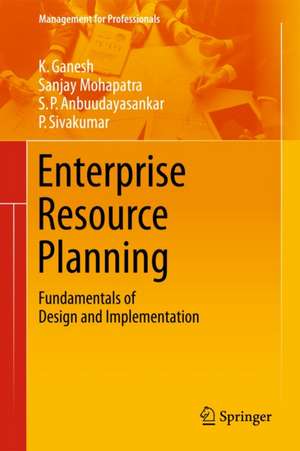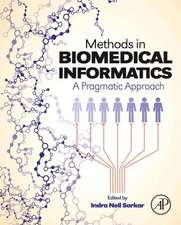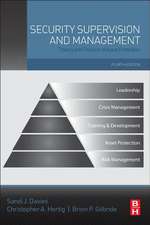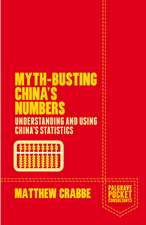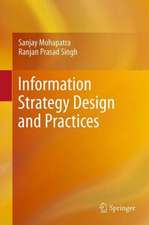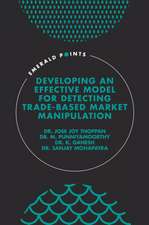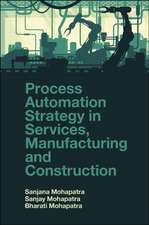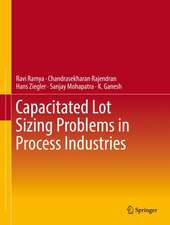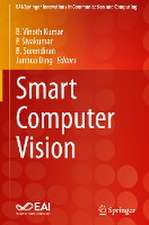Enterprise Resource Planning: Fundamentals of Design and Implementation: Management for Professionals
Autor K. Ganesh, Sanjay Mohapatra, S. P. Anbuudayasankar, P. Sivakumaren Limba Engleză Hardback – 8 iul 2014
ERP can be considered to be an integrated package of business process. The scope of ERP determines the extent of automation of business process. For example if ERP covers Human Resource (HR) and finance business processes only, then business process related HR and finance are automated. Typically business process that are automated in HR and finance employee entry and exist process, allocation of employee ID, payroll, processing , income tax planning and actual deduction etc. There is seamless flow of employee data and information is available at an effectively faster rate to take appropriate decision.
As custom demand increases, there is a need to meet the changing scenario with speed and efficiency. While there is a need to increase productivity, there is also a need to reduce cost of operation. The repetitive business processes can be handled effectively by automating them and freeing human resources for meeting other uncertainties. These automations not only should be done for each department, but also should cut across different departments. Thus there is a need for automating business processes at enterprise level. This enterprise level automation started with MRP, then MRP II, ERP and then finally open source ERP have taken centre stage. Out of the standard products available in the market, an organization can chose an ERP product for implementation, depending on the features available and the total cost of ownership (TCO). This comparison helps an organization to choose the product that best suits the needs for the organization. Enterprise Resource Planning: Fundamentals of Design and Implementation highlights these concepts while discusses different good practices to design and implement ERP.
| Toate formatele și edițiile | Preț | Express |
|---|---|---|
| Paperback (1) | 381.81 lei 6-8 săpt. | |
| Springer International Publishing – 17 sep 2016 | 381.81 lei 6-8 săpt. | |
| Hardback (1) | 388.90 lei 6-8 săpt. | |
| Springer International Publishing – 8 iul 2014 | 388.90 lei 6-8 săpt. |
Din seria Management for Professionals
- 20%
 Preț: 633.81 lei
Preț: 633.81 lei - 19%
 Preț: 517.16 lei
Preț: 517.16 lei - 17%
 Preț: 395.24 lei
Preț: 395.24 lei -
 Preț: 395.38 lei
Preț: 395.38 lei - 15%
 Preț: 590.49 lei
Preț: 590.49 lei -
 Preț: 361.44 lei
Preț: 361.44 lei - 17%
 Preț: 458.98 lei
Preț: 458.98 lei - 17%
 Preț: 362.79 lei
Preț: 362.79 lei - 18%
 Preț: 909.65 lei
Preț: 909.65 lei - 15%
 Preț: 593.08 lei
Preț: 593.08 lei - 20%
 Preț: 567.19 lei
Preț: 567.19 lei - 19%
 Preț: 424.00 lei
Preț: 424.00 lei - 15%
 Preț: 637.59 lei
Preț: 637.59 lei - 17%
 Preț: 526.71 lei
Preț: 526.71 lei -
 Preț: 500.84 lei
Preț: 500.84 lei -
 Preț: 358.00 lei
Preț: 358.00 lei -
 Preț: 358.27 lei
Preț: 358.27 lei - 15%
 Preț: 542.04 lei
Preț: 542.04 lei - 17%
 Preț: 429.18 lei
Preț: 429.18 lei - 19%
 Preț: 425.81 lei
Preț: 425.81 lei - 17%
 Preț: 361.91 lei
Preț: 361.91 lei -
 Preț: 500.18 lei
Preț: 500.18 lei - 17%
 Preț: 427.49 lei
Preț: 427.49 lei -
 Preț: 274.02 lei
Preț: 274.02 lei -
 Preț: 307.64 lei
Preț: 307.64 lei - 17%
 Preț: 362.15 lei
Preț: 362.15 lei -
 Preț: 393.52 lei
Preț: 393.52 lei - 17%
 Preț: 364.52 lei
Preț: 364.52 lei -
 Preț: 397.90 lei
Preț: 397.90 lei -
 Preț: 396.75 lei
Preț: 396.75 lei - 15%
 Preț: 622.88 lei
Preț: 622.88 lei -
 Preț: 397.03 lei
Preț: 397.03 lei -
 Preț: 359.92 lei
Preț: 359.92 lei -
 Preț: 472.35 lei
Preț: 472.35 lei - 17%
 Preț: 361.34 lei
Preț: 361.34 lei - 20%
 Preț: 567.19 lei
Preț: 567.19 lei - 19%
 Preț: 454.92 lei
Preț: 454.92 lei - 19%
 Preț: 521.24 lei
Preț: 521.24 lei -
 Preț: 356.79 lei
Preț: 356.79 lei -
 Preț: 505.65 lei
Preț: 505.65 lei - 17%
 Preț: 362.32 lei
Preț: 362.32 lei -
 Preț: 255.44 lei
Preț: 255.44 lei - 17%
 Preț: 458.93 lei
Preț: 458.93 lei - 17%
 Preț: 364.96 lei
Preț: 364.96 lei - 17%
 Preț: 361.43 lei
Preț: 361.43 lei - 17%
 Preț: 527.86 lei
Preț: 527.86 lei -
 Preț: 599.20 lei
Preț: 599.20 lei - 15%
 Preț: 426.05 lei
Preț: 426.05 lei - 18%
 Preț: 688.32 lei
Preț: 688.32 lei
Preț: 388.90 lei
Nou
Puncte Express: 583
Preț estimativ în valută:
74.42€ • 78.05$ • 61.95£
74.42€ • 78.05$ • 61.95£
Carte tipărită la comandă
Livrare economică 01-15 aprilie
Preluare comenzi: 021 569.72.76
Specificații
ISBN-13: 9783319059266
ISBN-10: 3319059262
Pagini: 184
Ilustrații: XII, 170 p. 29 illus., 19 illus. in color.
Dimensiuni: 155 x 235 x 16 mm
Greutate: 0.44 kg
Ediția:2014
Editura: Springer International Publishing
Colecția Springer
Seria Management for Professionals
Locul publicării:Cham, Switzerland
ISBN-10: 3319059262
Pagini: 184
Ilustrații: XII, 170 p. 29 illus., 19 illus. in color.
Dimensiuni: 155 x 235 x 16 mm
Greutate: 0.44 kg
Ediția:2014
Editura: Springer International Publishing
Colecția Springer
Seria Management for Professionals
Locul publicării:Cham, Switzerland
Public țintă
Professional/practitionerCuprins
ERP as a Business Enabler.- Introduction.- Core Process Analysis.- Conference Room Pilot.- Customisations.- Interface & Conversion.- System Integration Testing.- Training.- User Acceptance Test.- Production Go Live.- Roll Out.- Project Management.
Textul de pe ultima copertă
This book introduces the fundamental principles of understanding business requirements to apply enterprise resource planning (ERP) in order to meet business needs. The book also helps readers understand the usage of ERP for monitoring and controlling business processes, while providing practical oriented solutions to the design and implementation of ERP. Using the provided framework, a business can decide to provide more value at lower cost which increases its competitive advantage. This should be an ideal reference for executives, researchers and consultants in project management of ERP.
ERP can be considered to be an integrated package of business process. The scope of ERP determines the extent of automation of business process. For example if ERP covers Human Resource (HR) and finance business processes only, then business process related HR and finance are automated. Typically business process that are automated in HR and finance employee entry and exist process, allocation of employee ID, payroll, processing , income tax planning and actual deduction etc. There is seamless flow of employee data and information is available at an effectively faster rate to take appropriate decision.
As custom demand increases, there is a need to meet the changing scenario with speed and efficiency. While there is a need to increase productivity, there is also a need to reduce cost of operation. The repetitive business processes can be handled effectively by automating them and freeing human resources for meeting other uncertainties. These automations not only should be done for each department, but also should cut across different departments. Thus there is a need for automating business processes at enterprise level. This enterprise level automation started with MRP, then MRP II, ERP and then finally open source ERP have taken centre stage. Out of the standard products available in the market, an organization can chose an ERP product for implementation, depending on the features available and the total cost of ownership (TCO). This comparison helps an organization to choose the product that best suits the needs for the organization. Enterprise Resource Planning: Fundamentals of Design and Implementation highlights these concepts while discusses different good practices to design and implement ERP.
ERP can be considered to be an integrated package of business process. The scope of ERP determines the extent of automation of business process. For example if ERP covers Human Resource (HR) and finance business processes only, then business process related HR and finance are automated. Typically business process that are automated in HR and finance employee entry and exist process, allocation of employee ID, payroll, processing , income tax planning and actual deduction etc. There is seamless flow of employee data and information is available at an effectively faster rate to take appropriate decision.
As custom demand increases, there is a need to meet the changing scenario with speed and efficiency. While there is a need to increase productivity, there is also a need to reduce cost of operation. The repetitive business processes can be handled effectively by automating them and freeing human resources for meeting other uncertainties. These automations not only should be done for each department, but also should cut across different departments. Thus there is a need for automating business processes at enterprise level. This enterprise level automation started with MRP, then MRP II, ERP and then finally open source ERP have taken centre stage. Out of the standard products available in the market, an organization can chose an ERP product for implementation, depending on the features available and the total cost of ownership (TCO). This comparison helps an organization to choose the product that best suits the needs for the organization. Enterprise Resource Planning: Fundamentals of Design and Implementation highlights these concepts while discusses different good practices to design and implement ERP.
Caracteristici
Provides practical oriented solutions to the design and implementation to ERP Helps readers understand the usage of ERP for monitoring and controlling business processes Ideal resource guide for executives, researchers and consultants in project management of ERP Includes supplementary material: sn.pub/extras
